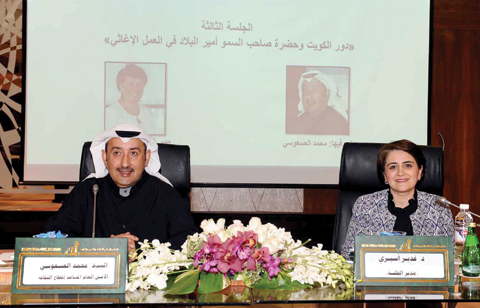 KUWAIT: Assistant Secretary General of the National Council for Culture, Art and Letters Mohammad Al-Asousi (left) speaks during the function. — KUNA
KUWAIT: Assistant Secretary General of the National Council for Culture, Art and Letters Mohammad Al-Asousi (left) speaks during the function. — KUNAKUWAIT: Humanitarian activists and officials commended Monday role of Kuwait and His Highness the Amir Sheikh Sabah Al-Ahmad Al-Jaber Al-Sabah in help of people in need in different parts of the world. Kuwait has always been contributing to development in Arab world and well-being of its people, and the country is keen on distancing relief aid from politics, Mohammad Al-Asousi, Assistant Secretary General of the National Council for Culture, Art and Letters (NCCAL), said.
Addressing function about humanitarian role of Kuwait and His Highness the Amir, part of Al-Qurain Cultural Festival, Asousi said humanitarian action was a major "arm of Kuwait's foreign policy, the culmination of which was establishment of Kuwait Fund for Arab Economic Development in December 1961, to provide financial and technical assistance to developing countries." Zakat (alms) House contributed over 40 Kuwaiti Dinars (KD) to charity projects, he said. Kuwait-based International Islamic Charitable Organization (ICCO) allocated KD 36 million for projects in 2012.
Al-Asousi said Kuwait's non-governmental organizations (NGOs) like the red crescent have numberous humanitarian contributions in many parts of the world, including the funding of development projects in disaster-hit areas.
His Highness the Amir hosted the Arab-African summit in November 2013, and the Kuwaiti leader ordered a $1 billion in easy loans for African countries for five years, and launched a $1 million prize after late Dr Abdulrahman Al-Sumait for development research in Africa, he said. Asousi noted that Kuwait hosted three international donor conferences for the Syrian people, extended a helping hand for the Iraqis and Yemenis.
Asaad Mustafa, advisor at the Kuwait-based Arab Fund for Economic and Social Development, said Kuwaiti volunteers spent days and nights delivering aid for the people in need in Syria, shortly after outbreak of the conflict in March 2011. Kuwait's humanitarian aid are unconditional, he noted.
Dr Mohammad Al-Rumaihi, sociology professor at Kuwait University, called for collaboration between relief organizations and businesspeople to find permanent humanitarian channels for Syria, Iraq, Libya and Yemen.
Sheikha Hessa Al-Thani, Arab League Secretary General's humanitarian envoy, supported Rumaihi's proposal. "I would raise the issue of coordination of efforts," she said. Sheikha Hessa added that refugees in the camps would return to their homes one day. Dr Adel Al-Zayani, Director of Human and Environmental Affairs at GCC secretariat, said humanitarian issues and volunteering should be distinguished. - KUNA










